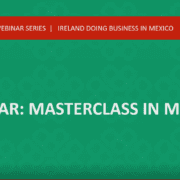Irish medical devices firms look to crucial Italian market
For the medical devices industry, there are few places on the planet as important as the Mirandola Biomedical District. North of the Italian city of Modena in the Emilia Romagna region, Mirandola is home to a significant cluster of more than 300 related companies.
In fact, it’s the largest biomedical district in Europe and third in the world after Minneapolis and Los Angeles in the United States, making it an incredibly important and fertile market for Irish medical device and medical technology (medtech) businesses.
Italy is also the third largest market for medical equipment in the EU, after Germany and France.
Irish firms bringing innovation to Italy
In September, 12 Irish medtech companies visited Mirandola to meet local business leaders as part of an Enterprise Ireland trade delegation aimed at driving further trade and collaboration.
This visit was incredibly valuable in bilateral terms, explains Alessio Nori is Senior Market Adviser, Life Sciences, Enterprise Ireland.
“Ireland is also of strategic importance in this sector,” he says, “as it is one of the top five global medtech hubs, along with Massachusetts, Minnesota, California and Israel. This was an ideal opportunity for Irish firms to showcase their innovative products and solutions to Italian buyers.”
During the visit, the Irish companies participated in more than 40 meetings with representatives of 16 Italian companies. “This proved an incredibly useful and significant opportunity for the Enterprise Ireland client companies who participated in the visit,” says Alessio.
The group also made site visits to some of the most important medical device manufacturers in the Emilia-Romagna region.
Among these visits was a factory tour of Orthofix, a US orthopaedics company which has a significant presence in Italy.
Marking the strategic importance of the trade visit, the Ambassador of Ireland to Italy, Patricia O’Brien, hosted a gala dinner for C-level Irish and Italian medical devices executives while the Irish delegation was in Italy.
Irish export confidence remains high
Despite the challenging economic environment, there was a buoyancy among our client companies about future business sentiment and optimism.
Nine-in-ten (91%) said they expect their exports to increase next year. Almost two-thirds (59%) said their export sales have increased so far this year when compared to last year, and almost one-third (32%) said they have remained stable.
Most of the exporters we surveyed (84%) plan to enter new markets in 2023, with North America highest on the list, followed by Europe and the UK. Two thirds (62%) of those planning to enter new markets told us that expanding their overseas market presence is their biggest priority for the next year.
A crucial, cutting-edge Italian cluster
Mirandola created €1.6bn in added value for the Italian economy in 2020. Companies in the cluster specialise in disposable plastic products for medical and healthcare use.
They are also looking ahead, and investing in regenerative medicine, for example. This looks to break down the boundaries between biomedical and pharma, medical devices and therapies.
This signposts particular opportunity for Irish firms. There are about 450 medtech, and medtech-related, companies in Ireland.
They design and produce products across a swathe of medicine and healthcare, including infusion solutions, haemodialysis, anaesthesia, continuous renal replacement therapies, cardiovascular and more.
“About 60 percent of these are Irish firms, with the remainder being multinationals,” explains Conor Byrne, Market Executive at Enterprise Ireland. “Many of the local companies are young, start-up companies that are developing advanced innovative medical technologies for global markets.”
Sales from these businesses account for about €2.1bn of the almost €13bn in annual exports of medical technologies from Ireland.
Medical Devices sector vital to Ireland and globally
Overall, the medical devices sector employs more than 40,000 people in Ireland and companies here lead the way on multiple fronts.
Firms located in Ireland manufacture 80pc of cardiovascular stents used globally, along with 75pc of knee implants, 50pc of ventilators used in acute hospital wards and 25pc of injection devices for diabetics.
“Site visits such as those during our recent trade event in Italy are vitally important for Irish companies to understand the needs of Italian companies,” explains Alessio. “They allow these businesses to discover how they might tailor their offerings to enable them to enter or grow within the Italian market. That in turn boosts their international expansion efforts.”
Appreciate the long-term opportunity
While the sales cycle can be long in this sector, it’s worth bearing in mind that medical device companies typically develop stable products that remain on the market for a decade or more, and rely on a strong, stable supply chain to keep products flowing to the market.
That means once companies are approved as suppliers, they typically enjoy long-standing relationships, often getting orders spanning five to 10 years.
Enterprise Ireland client companies interested in exporting into the Italian medical devices sector should contact the Enterprise Ireland office in Milan, which has extensive connections in Mirandola and beyond.
Whether you need to connect with decision-makers in production, or insights around logistics or any other department, Enterprise Ireland can offer support and help make the introductions you need.
Learn more about exporting to Italy and gain valuable market insights here.
Discover more about Ireland’s life sciences and medical devices sector here.




